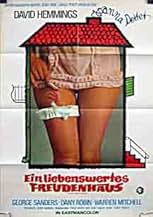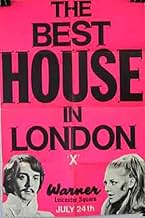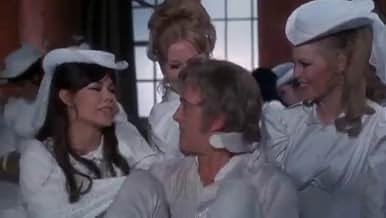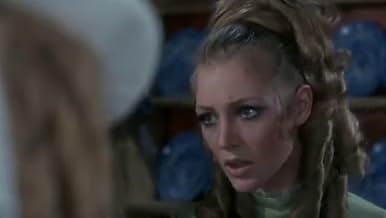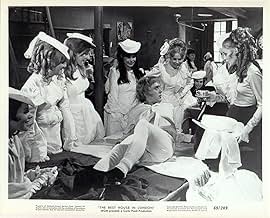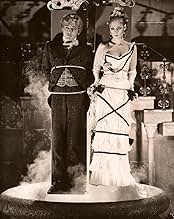In Victorian London, the British Government attempts a solution to the problem of prostitution by establishing the world's most fabulous brothel.In Victorian London, the British Government attempts a solution to the problem of prostitution by establishing the world's most fabulous brothel.In Victorian London, the British Government attempts a solution to the problem of prostitution by establishing the world's most fabulous brothel.
- Director
- Writer
- All cast & crew
- Production, box office & more at IMDbPro
Featured reviews
This is the 1960's and the wild, the wacky, and the wacky-baccy has started to get to people's heads. This is one of those films that you feel is going to end up with a speed-ed up chase scene with all that you have learnt so far carefully junked -- but it doesn't quite get there. Close -- but not quite.
However it is also a classic case of setting up a plot and not bothering with it after a certain point in time. Maybe it didn't fit in with the bare breast quota laid down by the producers or maybe they spent too much time try to work out how to best film down a woman's cleavage?
The casting of the (now late) David Hemmings in a double role (bad/good) is a fatal mistake because both characters act pretty much the same and we only have hair colour to tell one from the other. After Blow Up he was seen as hot property although he is a cold fish who can't act a jot!
If you don't come from England and don't know Victorian literature then a lot is going to fly over your head. Given that the jokes are rare enough already the film can't afford their loss -- especially to a world audience. Indeed some of the jokes are in very bad taste: A little girl singing about her "little pussy" while we focus on George Sanders doing double-takes wouldn't be allowed today.
The Best House in London doesn't really have a plot more a laundry list of things that they want to get in. A mad Italian with an airship, the temperance movement, the Suffragettes, the upper/lower classes, people that are pro/anti the whore trade and women that don't want to be saved from a life of vice. Big money has been spent on the sets (complete with half dressed girls) and the left over change has gone on the script.
This is the kind of stuff I like watching late at night when I can't sleep (TCM puts it on that this time) when on-screen energy means more than common-sense. I am giving it a seven because I was entertained, but maybe that seven says just as much about me, where I come from and what I like than it does about the film. I can forgive campy nonsense -- can you?
The film is a comedy about a proposal to set up a government-sponsored brothel in Victorian London and the resistance to that proposal led by Lady Josephine Pacefoot, an anti-prostitution campaigner. Hemmings plays two characters, Walter Leybourne, the instigator of the scheme, and Benjamin Oakes, an idealistic young journalist who gets involved in Lady Josephine's campaign. The physical similarity between the two men is explained when they turn out to be long-lost half-brothers; both (implausibly, given Hemmings's blond looks) are illegitimate sons of the Chinese Ambassador.
The film is some time during the reign of Queen Victoria, although it is impossible to be more precise than that. The fact that Elizabeth Barrett and Robert Browning are courting but not yet married would suggest that the action takes place around 1845. (They married in 1846). The presence of Oscar Wilde and Lord Alfred Douglas, who first met in 1891, coupled with references to Jack the Ripper (1888) and the Eiffel Tower (1889), would however suggest a date nearly fifty years later. The writer Denis Norden stuffed the script with references to events such as the Opium Wars and the Indian Mutiny and there are walk-on appearances by various other Victorian celebrities, such as Dickens and Tennyson. Norden seems to have deliberately ignored the fact that, as Victoria ruled for over sixty years, many people whom we think of as "Victorians" were far from exact contemporaries of one another.
I was surprised to see reviews on this board comparing the film to Monty Python, as it seems to me to have little to do with the Pythonesque or Goonish tradition of surreal humour, despite the presence of a pre-Python John Cleese in a minor role. Rather, it derives from a quite different strand of British humour, the bawdy tradition of the "Carry On" films. This tradition was already strong in the late sixties, and was to become the dominant one in the British cinema (although fortunately not on television) during the seventies. The film has also been described as satirical, although it contains little satire worthy of the name; it is hardly cutting-edge humour to satirise the ways of a hundred years ago. As for the suggestion that Josephine Pacefoot is a satirical portrait of Dame Josephine Butler, I cannot for the life of me see why Norden might have wanted to satirise someone who had been dead for more than sixty years when the film was made and who the great majority of his audience would never have heard of.
What the film does contain is a good deal of semi-nudity and innuendo-laden humour. Most sixties sex comedies today seem about as offensive as a seaside postcard, and a lot of the material in "The Best House in London" today seems bland and harmless, if not particularly funny. Nevertheless, some scenes actually seem worse today than they probably did forty years ago. At one point we hear a suggestive song about "my pussy". Had this song been performed by an adult woman, it would today provoke nothing more than a sigh of "Oh no! Not that old joke again!" (Even in the sixties jokes playing on the fact that the same word can mean both "cat" and "vagina" must have seemed pretty corny). As, however, it is sung by a young child, it comes across today as an unpleasant, even sinister, piece of humour.
Although the film does not tell us much about the age in which it is ostensibly set, it does perhaps inadvertently tell us something about the age in which it was made. It is essentially a two-joke film. The first joke is that, behind a mask of piety and respectability, Victorian men were in fact all incredibly randy. The second joke is that Victorian women were mostly at heart prostitutes; the saintly Lady Josephine's endeavours to save women from a life of degradation are constantly thwarted by the fact that they do not want to be saved and would much prefer to continue to prostitute themselves.
The first of these jokes is perhaps based upon a half-truth; social disapproval of vice and prostitution has never, in the Victorian age or any other, prevented it from flourishing. Behind the laughter, however, one can detect the uneasiness which the advocates of sixties permissiveness felt about Victorian values; the film never tackles nineteenth-century objections to prostitution head on but evades them by suggesting that they were never anything more than a hypocritical façade. As for the second joke, that is surely rooted in some very strange and distorted attitudes towards women. The wonder is that forty years ago such attitudes were put forward as being somehow progressive. Neither joke ever succeeds in raising many laughs. 4/10
The plot, such as it is, is mainly advanced by extraordinarily implausible coincidences and bizarre happenings, and it's about as silly as you can get.
It's a formula movie, and it sucks. Unfortunately, it isn't quite awful enough to be 'so bad it's good'. It's just excruciating.
However, it was written by Denis Norden, who may have no idea about plot or character, but is a fantastic quip-writer. There are scores of literary and historical jokes: one- and two-liners, many of them screamingly funny if you're familiar with the works of Wilde, Dickens, Trollope, Galsworthy, Tennyson et al, and with historical people like Emmeline Pankhurst and Dr Livingstone. Jokes as good as these are wasted on this awful film.
After the first ten minutes the plot is so muddled that the average viewer will give up.
I stuck with this hoping it would get better. By the middle, I was completely confused and bored. It seems every stereotypical character from the Victorian era is thrown in.
I was half expecting to see Sherlock Holmes. It's true that this movie mixes historical characters with fictional ones without regard to the era. Dickens appears along with those from a later period. But you won't notice. By that time you'll be bored or asleep.
There are a few scenes that really offended me, such as the one with the little girl singing the stupid song. I am surprised that TCM put this on in the daytime.
Stay away.
Did you know
- TriviaThe second of four times that Thorley Walters played Watson, each with a different actor playing Sherlock Holmes. He previously did so in Sherlock Holmes and the Deadly Necklace (1962) starring Christopher Lee and later did so in The Adventure of Sherlock Holmes' Smarter Brother (1975) starring Douglas Wilmer and Silver Blaze (1977) starring Christopher Plummer.
- Quotes
Sir Francis Leybourne: [the Attache is sobbing] I thought you people were supposed to be inscrutable?
Chinese Trade Attache: Please, Sir Francis, China doesn't want any more opium.
Sir Francis Leybourne: Oh, do be sensible. You chaps have already lost one war with Great Britain about this.
Chinese Trade Attache: But to force us to buy it...
Sir Francis Leybourne: Well, you signed a treaty agreeing to!
Chinese Trade Attache: Your gunboats were right up our Yangtze!
Sir Francis Leybourne: No use getting hysterical, Mr Feng.
Chinese Trade Attache: Then let me appeal to our friendship; those happy weekends I used to spend at your townhouse; your late wife was always so kind to me. More than kind. She...
Sir Francis Leybourne: She was an eccentric about the inferior races. My dear fellow, I've put a lot of money into that opium plantation. Damn it, it's hard enough to get the Indians to harvest the stuff. Blasted natives! You pay them two pounds ten a year and they're useless.
Chinese Trade Attache: If you could see what the opium does to our people; they lie about the streets like dead flies.
Sir Francis Leybourne: Well, get them to use a little self-discipline, man. Self control - works wonders. Look at the English!
- ConnectionsReferenced in The Magic Garden of Stanley Sweetheart (1970)
- How long is The Best House in London?Powered by Alexa
Details
- Runtime
- 1h 37m(97 min)
- Aspect ratio
- 1.85 : 1

